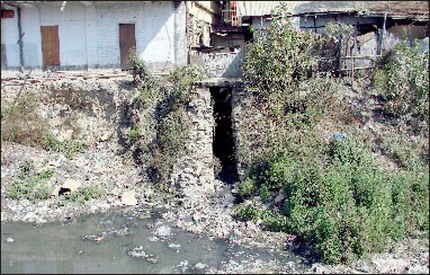Imphal, February 9 : Contrary to drainage system in human settlement zones conceptualised as a way to wash away waste materials that would enable citizens live a healthy life the very system, if we can call it a sytem, in the capital city, according to many, has turned into a breeding ground for diseases.
A random survey conducted by The Sangai Express as part of 'My City, My Life', stumbled upon almost the entire drains in the city areas clogged and prone to disease outbreaks thereby endangering the citizens.
Some outstanding reasons pointed out by those associated with the issue on why the drainage system of the capital city remain a failed case include clogging, similar level of drains compared to road surface and absolute absence of initiative to dredge the river beds where water-waste combination can easily flow into.
A random survey conducted by The Sangai Express as part of 'My City, My Life', stumbled upon almost the entire drains in the city areas clogged and prone to disease outbreaks thereby endangering the citizens.
Some outstanding reasons pointed out by those associated with the issue on why the drainage system of the capital city remain a failed case include clogging, similar level of drains compared to road surface and absolute absence of initiative to dredge the river beds where water-waste combination can easily flow into.
|
Encroachment upon natural waterways is another important deterrent hampering smooth draining of wastes, they pointed out.
The capital city divided into 27 municipal wards annually witnesses inundation at the slightest drizzle with the citizens the ultimate sufferers not only in wadding through the water-logged roads but having to endure seasonal outbreak of diseases.
It is a common sight rather than an exception that the drainage systems in the entire Imphal Municipal Council area remain under murky water with construction works of the system reduced to an eyewash as such an initiative remain incomplete.
Frankly speaking certain portions of drainage system in a particular locality are constructed with a tell-tale sign of the contractor concerned being the only beneficiary as the water-waste flow is stagnant due to incomplete connectivity to the main drain.
Here, the Government is not the lone defaulter as the citizens too seem to remain indifferent regarding importance of drains to keep away potential disease onslaught as drains are considered to be waste dumping sites.
It should not be lost on the part of the citizens that water pipes are laid along or close to drains.
Commenting on the issue, Ward No-4 Councillor Manoharmayum Bimolchandra, a resident of Nagamapal Singjubung Leirak expressed outrage at the sight of drains being clogged with plastic wastes (polythene bags/pouch) and strongly advocated awareness among the citizens for collection and dumping away the menace at a proper place.
pointing out that level of drains are deeper than that of streams/rivers consequently preventing flow of wastes, the Councillor also suggested regular dredging of river beds which was a common exercise during the rule of kings.
He also warned of dangers posed by clogged drains with the reference that pipes for drinking water are laid along the local drain.
Sharing his views, ward No-14 Councillor Haobam Santosh not only lamented absence of well defined steps to construct and maintain drainage system of a locality but also regretted lack of aptitude of heavy vehicle operators who ignore the fact that local drains are susceptible to damage when narrow lanes are trampled upon.
Expressing that community servicing is an inevitable apparatus for proper maintenance of a locality's drainage system rather than wait for Government initiative, Santosh said pre-monsoon cleansing of drains would go a long way in preventing disease outbreaks.
Significantly, Th Bijen, who is the Implementation Committee Convenor of Imphal Municipal Council overseeing works being taken up under the Ministry of urban Development's Jawaharlal Nehru Urban Renewable Mission conceded that drainage system in and around the capital city requires immediate attention as they are in a highly deplorable condition.
Noting that drain construction works in the past were carried without proper planning or taking into account the city structure and ways to drain out excess wastes with water, he attributed such lack of foresight as the chief factor for failure of drainage system and frequent inundation of localities.
Striking a positive posture, the Convenor confided of a five member team of Hyderabad-based National Consultancy for Planning and Engineering of conducting a survey since january 7 to realign the Imphal drainage systems in order to ensure existence of a functional system.
Awakening the citizens that Kongba, Nambul and Imphal rivers are the main waterways that used to carry away waste materials from Imphal areas, Bijen urged the people to inculcate civic sense and contribute their mite in saving the capital city.
Highlighting health hazards posed to the citizens due to clogging of drains, Additional Director (Public Health) of the State's Health Department Dr Bhubonchandra iterated that stagnant drains become breeding ground for mosquitoes and flies.
Buzzing of mosquitoes even during winter months which had been a common phenomenon for the last many years is an example of Imphal area drains remaining clogged, he explained.
Cautioning that citizens would continue to suffer in case the drainage system remain in the same perilous condition, Dr Bhubonchandra elaborated that with most water pipes laid near or along drains there is high possible of germ infected water seeping into leaked pipes through which drinking water are carried.
Consumption of contaminated water causes diseases such as hepatitis, typhoid, malaria, diarrhoea, infection of eyes etc.

No comments:
Post a Comment